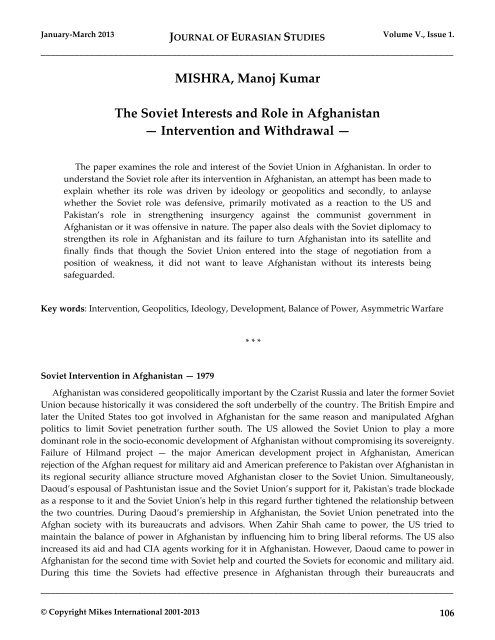JOURNAL OF EURASIAN STUDIES Journal of the Gábor Bálint de ...
JOURNAL OF EURASIAN STUDIES Journal of the Gábor Bálint de ...
JOURNAL OF EURASIAN STUDIES Journal of the Gábor Bálint de ...
Create successful ePaper yourself
Turn your PDF publications into a flip-book with our unique Google optimized e-Paper software.
January-March 2013 <strong>JOURNAL</strong> <strong>OF</strong> <strong>EURASIAN</strong> <strong>STUDIES</strong> Volume V., Issue 1.<br />
_____________________________________________________________________________________<br />
MISHRA, Manoj Kumar<br />
The Soviet Interests and Role in Afghanistan<br />
— Intervention and Withdrawal —<br />
The paper examines <strong>the</strong> role and interest <strong>of</strong> <strong>the</strong> Soviet Union in Afghanistan. In or<strong>de</strong>r to<br />
un<strong>de</strong>rstand <strong>the</strong> Soviet role after its intervention in Afghanistan, an attempt has been ma<strong>de</strong> to<br />
explain whe<strong>the</strong>r its role was driven by i<strong>de</strong>ology or geopolitics and secondly, to anlayse<br />
whe<strong>the</strong>r <strong>the</strong> Soviet role was <strong>de</strong>fensive, primarily motivated as a reaction to <strong>the</strong> US and<br />
Pakistan’s role in streng<strong>the</strong>ning insurgency against <strong>the</strong> communist government in<br />
Afghanistan or it was <strong>of</strong>fensive in nature. The paper also <strong>de</strong>als with <strong>the</strong> Soviet diplomacy to<br />
streng<strong>the</strong>n its role in Afghanistan and its failure to turn Afghanistan into its satellite and<br />
finally finds that though <strong>the</strong> Soviet Union entered into <strong>the</strong> stage <strong>of</strong> negotiation from a<br />
position <strong>of</strong> weakness, it did not want to leave Afghanistan without its interests being<br />
safeguar<strong>de</strong>d.<br />
Key words: Intervention, Geopolitics, I<strong>de</strong>ology, Development, Balance <strong>of</strong> Power, Asymmetric Warfare<br />
Soviet Intervention in Afghanistan — 1979<br />
* * *<br />
Afghanistan was consi<strong>de</strong>red geopolitically important by <strong>the</strong> Czarist Russia and later <strong>the</strong> former Soviet<br />
Union because historically it was consi<strong>de</strong>red <strong>the</strong> s<strong>of</strong>t un<strong>de</strong>rbelly <strong>of</strong> <strong>the</strong> country. The British Empire and<br />
later <strong>the</strong> United States too got involved in Afghanistan for <strong>the</strong> same reason and manipulated Afghan<br />
politics to limit Soviet penetration fur<strong>the</strong>r south. The US allowed <strong>the</strong> Soviet Union to play a more<br />
dominant role in <strong>the</strong> socio-economic <strong>de</strong>velopment <strong>of</strong> Afghanistan without compromising its sovereignty.<br />
Failure <strong>of</strong> Hilmand project — <strong>the</strong> major American <strong>de</strong>velopment project in Afghanistan, American<br />
rejection <strong>of</strong> <strong>the</strong> Afghan request for military aid and American preference to Pakistan over Afghanistan in<br />
its regional security alliance structure moved Afghanistan closer to <strong>the</strong> Soviet Union. Simultaneously,<br />
Daoud’s espousal <strong>of</strong> Pashtunistan issue and <strong>the</strong> Soviet Union’s support for it, Pakistan's tra<strong>de</strong> blocka<strong>de</strong><br />
as a response to it and <strong>the</strong> Soviet Union's help in this regard fur<strong>the</strong>r tightened <strong>the</strong> relationship between<br />
<strong>the</strong> two countries. During Daoud’s premiership in Afghanistan, <strong>the</strong> Soviet Union penetrated into <strong>the</strong><br />
Afghan society with its bureaucrats and advisors. When Zahir Shah came to power, <strong>the</strong> US tried to<br />
maintain <strong>the</strong> balance <strong>of</strong> power in Afghanistan by influencing him to bring liberal reforms. The US also<br />
increased its aid and had CIA agents working for it in Afghanistan. However, Daoud came to power in<br />
Afghanistan for <strong>the</strong> second time with Soviet help and courted <strong>the</strong> Soviets for economic and military aid.<br />
During this time <strong>the</strong> Soviets had effective presence in Afghanistan through <strong>the</strong>ir bureaucrats and<br />
_____________________________________________________________________________________<br />
© Copyright Mikes International 2001-2013 106

















